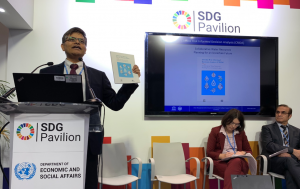Climate Risk-Informed Decision Analysis Featured at COP25

Anil Mishra of UNESCO IHP discussing the use of CRIDA at the 25th Conference of the Parties. Photo Credit: Henk Ovink.
Climate Risk-Informed Decision Analysis (CRIDA) and related risk-based water management approaches were featured at the various events at the 25th Conference of the Parties of the UN Framework Convention on Climate Change (COP25). The CRIDA methology was jointly developed by ICIWaRM, The Alliance for Global Water Adaptation (AGWA), Deltares, UNESCO-IHP, the University of Massachusetts, and the World Bank, and was co-published by ICIWaRM and UNESCO.
Anil Mishra, a program specialist of the Hydrological Systems and Water Scarcity Section of UNESCO IHP, spoke during two interviews and several events on the need for climate informed decision making that integrates analytical and stakeholder approaches to assess impacts and risks within a quantitative framework. With the appropriate information at hand, decision makers can negotiate performance trade-offs among ecological requirements, infrastructure and social resilience. Climate Informed decision making involves risk analysis which emphasizes a shared vision among sectoral stakeholders and decision makers to define robust and flexible solutions. He noted that taking climate-informed decisions is especially relevant at the basin and transboundary level since climate (and many other) risks do not recognize borders and require joint actions by countries.
Dr. Mishra serves as a co-coordinator of the UN-Water Expert Group on Water and Climate, and leads the G-WADI major initiative of IHP. ICIWaRM serves as G-WADI’s global technical secretariat.
